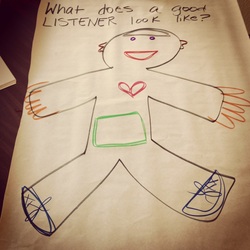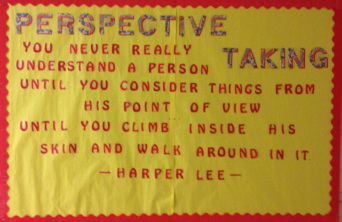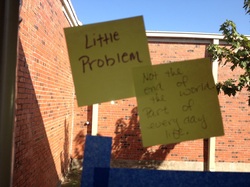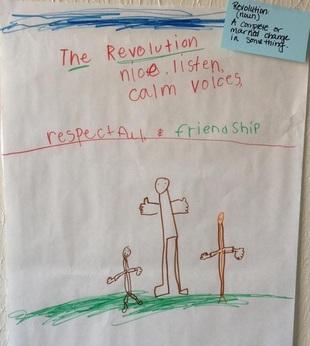 Whole Body Listening is a great topic to discuss with younger students who are learning how to behave in school. I have found it a great way to talk to Kindergarten and First graders about classroom expectations regarding listening and body control.
To start the lesson, I read the story Howard B. Wigglebottom Learns to Listen by Howard Binkow. In this book, Howard, a precocious young rabbit gets in a lot of trouble for not listening to the people around him. When Howard begins listening to friends and family, he finds that he is in trouble less and has better relationships with them.
After reading the book, we discussed all of the parts of a good listener. For Whole Body Listening, it takes every part of your body to be a truly effective listener. This includes, Listening Ears, Thinking Brain, Watching Eyes, Quiet Mouth, Caring Heart, Body Forward, Hands and Feet to Self.
To close, each student created their own listener complete with all of these parts, plus any other decoration they wanted to add.
 Perspective Taking is the skill of being able to look at things from another persons point of view. This can be essential when teaching how to be a good friend and conflict resolution. Really, perspective taking is essential to all aspects of life, from being patient in the lunch line to helping out around the house.
I got the basis for this lesson from the website of a fantastic teacher out of Austin ISD. If you like to read a little more about her lessons and classroom, check her out at http://acardenas.weebly.com/.
Perspective Taking Lesson - Week of October 22, 2012
Opening:
Line up various shoes, ranging from a baby shoe to a high heel to a man’s shoe. Ask questions about what they can tell about each of the people who might wear each. Talk about who the person is, where they might be going, what they might like to do, etc. Ask what kinds of thoughts and feelings each might have.
Discussion:
Talk about the idiom, “Put yourself in someone else’s shoes.” First, talk about it literally - we can't literally put ourselves in certain shoes because they won't fit or we wouldn't choose to wear them because we are all so different. Then, talk about the metaphorical meaning. You CAN put yourself in another person’s shoes by trying to imagine what they might be going through in their life and how those things might be impacting them.
Activity:
After discussing what perspective taking means using the visual attached below, I show them various pictures and ask inference/perspective taking questions. Use the “How Do You Feel?” wall to discuss what some of those students might be thinking or feeling. Write some things that might be happening with each person on the wipe off thought bubble by the picture.
 A lot of students have difficulty discerning between little problems and big problems. Most frequently, students that have difficulty with this treat every problem like it is a big one, giving the same reaction to forgotten homework as one might to a broken arm.
The Big Problem vs Little Problem exercise has students place different problems on a continuum of little problem to medium problem to big problem. The picture to the left shows how I did this lesson in my classroom. I put a line of painters tape down my window and put post-it notes with little problem, medium problem, and big problem on the left, middle, and right of the line. We then talk about how you might define little problem (Not the end of the world. Part of everyday life.), medium problem (Not everyday. These are tough but not more than we can handle.), and big problem (These super-stink and take special effort to fix.). Students then place examples of different problems they might encounter on the line where they think they belong.
Some examples of problems are, "forgot lunch," "got a paper cut," "got hurt on the playground," "was involved in bullying," "was expelled." I let students add their own examples but I try to stay away from specific "big problems" that students might have experienced in their own lives. The biggest problems, I make a little bit silly, i.e.: "the school is invaded by aliens." This is especially the case with students who might have experience trauma in their own lives.
This is a fun activity to get kids up and moving, while opening the door to a discussion about different levels of problems and appropriate ways to react when faced with little and medium problems. In addition, the language students learn during this activity can be carried over to the classroom and home to discuss appropriate reactions while in the process of specific situations.
Unfortunately, with some of the activities of last week, my two groups are a week off. This week, the Thursday group will be developing their group name, writing their social contract, and discussing how we participate as a group.The Tuesday group will be moving ahead, with a lesson on You Are A Social Detective (for more information, check out Books We're Reading). In addition to talking about school vs. social smarts, it introduces concepts such as, thinking with your eyes, expected and unexpected behaviors, and being a social thinker. Between sections on School and Social Smarts / Expected Behavior, Unexpected Behavior, and Being a Social Detective, we will be discussing how these concepts can be used throughout day-to-day life.Discussion points that you might also be interested in talking about at home:* What are some ways that you know what behaviors are expected of you? At home? At school? At sports, church, or other community locations? (social contract, class rules, etc.)* What are some ways that you know what behaviors are unexpected? (moving card, call out from teacher, unable to participate in fun activities)For more on the terms expected behavior and unexpected behavior, check out Using "Expected" and "Unexpected" Rather Than "Appropriate" and "Inappropriate" to Describe Behavior. * How do parents, teachers, friends, and classmates act when you behave unexpectedly?* How can you be a Social Detective in your every day life?
 For our first breakfast meeting, we will be deciding on our group names and creating a social contract that discusses how we will expect to be treated and how we will be expected to treat each other. Every member of the group (including myself) will sign the contract stating that this is how we will treat one another when we meet together.
On the left, there is a picture of the first group's contract that they decorated themselves. Their names/signatures have been removed to preserve their confidentiality. This group decided to call themselves "The Revolution."
The dictionary defines a revolution as, "a complete or marked change in something." I could not have picked a better name myself! This group could certainly serve as a BEHAVIOR revolution!
September 11, 2012Dear parents, I just wanted to introduce myself as the new behavior specialist for Bowie Elementary School. Many of you knew the previous behavior specialist, Ms. Miles, very well. I will be continuing in a very similar capacity. In addition to meeting with students individually, new for the 2012-2013 school year will be weekly breakfast groups and a regular schedule of student observation and data collection. I feel that both of these will help us keep a more accurate gauge on student progress and assist them in developing more appropriate tools for dealing with the everyday challenges of school and life. Also new for this year will be a website/blog that I will be keeping up for you and your children – campbellbehaviorspecialist.weebly.com (no www. needed). It will include blog entries on the theme/lesson for that week’s breakfast group and entries on different ways to foster social skills at home, behavior management for home and school, and building consistent messages about expected behaviors between home and school. I am really looking forward to get to know each of your children! If you have any question, concerns, or would like to discuss or any unexpected changes that might be affecting your children, feel free to contact me at any time. Thanks so much,Liz Campbell Liz Campbell Behavior Specialist Bowie Elementary School [email protected] 972.262.7348
|




 RSS Feed
RSS Feed